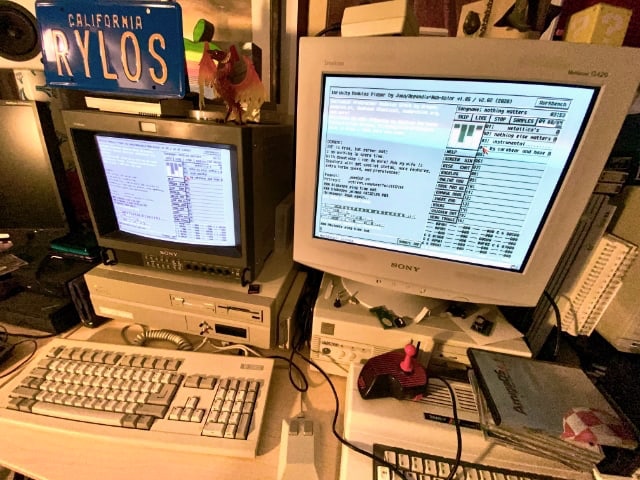
Vintage computing aficionados take various approaches to the hobby. Some enjoy the platforms of olde exclusively through emulation on modern systems. Others assemble shelf after shelf of as many computers and peripherals of their fancy as they can find. While, still, others use their allotted space to host various complete and working systems that can be powered on and used with the flip of a switch. I happen to fall in this last camp of those who compute nostalgic. And, as such, I am happiest when my systems are in use, doing their thing in interesting ways. It is for this reason that I have been so very enthralled by a new MOD player for the Amiga since I discovered it earlier this week.
First, a bit of history. A MOD file or “module” is the original “tracker” file format, combining musical note information (akin to MIDI data) along with the digitized audio instrument samples (of which there can be 16) needed to play back the contained score. The format originated with Karsten Obarski’s Ultimate SoundTracker application for the Amiga computer, which was the first tracker ever developed, released in 1987. (I recall finding someone on the Usenet in California willing to ship me a box of floppies containing Ultimate SoundTracker and many dazzling MOD files for use on my Amiga 2000.) The Amiga’s sound hardware is capable of playing digitized samples across four audio channels with little CPU intervention. A tracker is an application that allows the entry of musical note information (by way of a computer or musical keyboard (if a MIDI interface is present)) and the arranging of sound samples called upon by the note information. Many other trackers would follow on Amiga, PC, and other platforms, bringing improvements such as higher sample rate, more audio channels, L/R panning, etc. The tracker scene is a subset of the demoscene.
The Infinity Modules Player (or IMP), written by Pawel Nowak, is a tiny (23Kb currently) MOD player, written entirely in M68K assembly language, that packs a dizzying array of features and provides a reason for anyone with a networked Amiga to never turn it off again. It was first released earlier this year.
At its core, IMP is a networked module player that pulls tracks from a server hosting ~100,000 MODs and plays them, one after the other. The program will run on any networked Amiga with a MC68000 CPU or better, running Kickstart 2.0 on up, as well as Morphos and AROS 68K.
Like most networked Amiga applications, IMP uses the bsdsocket.library to connect to the internet, so it should work fine with TCP/IP stacks such as AmiTCP, Genesis, and Roadshow (as well as the ubiquitous UAE Amiga emulator). Most of the sizable array of Ethernet adapters for various Amigas should work fine in this capacity, as well as the open-source Plipbox, an ethernet adapter that attaches to the parallel port of any Amiga (and, as such, is a particularly easy way of getting an Amiga on a network).
A MOD that is currently playing can be liked or unliked, skipped, saved to disk, or shared as a suggestion link to others in an integrated network chat system, another of IMP‘s notable features, that lets others running the program chat with one another while listening to tracker tunes. The chat system has a main lobby and allows the creation of private channel. It even features an integrated simple MUD-like network game.
IMP has a few other network tricks up its sleeve. In a nice feature that feels quite anachronistic for an Amiga app, IMP auto-updates itself on launch when there is a new version available. In the few days I’ve been running it, I’ve seen three updates come down. Another, perhaps unexpected, feature is a file-tree of games, utilities, and such that presents itself at the click of a button. Any executable on the tree, when double-clicked, is pulled from the network server and can be saved locally or executed immediately. (Again, somehow this program is 23K in length.)
There current release version 1.05 features two different display modes. There is a “screen” mode where the app renders its own interface, all things locked in place, as well as a Workbench mode, where the various display items are presented in windows that can be moved about on the Workbench desktop.
As initially downloaded, IMP features limited functionality and notably restricted network speeds. A simple (free) registration unlocks nearly all of the functions of the app, with a few special features unlocking for users who have donated to the effort either via the Patreon or a PayPal donation. I was happy to contribute via the latter avenue, given the impressive functionality of this tiny little app.
Nowak, the author, is part of Project R3D, which is a small group of developers making new, noncommercial games for the 68K Amiga platform.
See the forum thread discussing the Infinity Modules Player and its development along with the download link over on Aminet.

Pingback: Looking Back on 35 Years as an Amiga User - Byte Cellar
I think it’s awesome that software is still being released to support tracking. I spent a good number of years in the 90s creating music with trackers in DOS, and then Windows.
Tracker music files are still one of the best, in my opinion, ways for sharing and remixing each other’s work.
Just for this app alone I’d consider buying an Amiga!